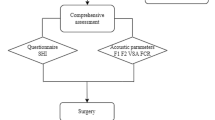Abstract
Purpose
Oral or oropharyngeal tumors degrade patients’ speech quality because of their location. The treatment of these cancers also affects the functional outcomes, depending on type (surgery, radiotherapy, chemotherapy), volume resection (according the size of the tumor) or on the anatomical area treated, and the post-treatment delay. The aim of this work is to determine the factors influencing the chronic speech disorders (in terms of intelligibility and severity) of patients treated for an oral or oropharyngeal cancer.
Methods
Speech-perceptive assessment was led by a panel of six expert speech therapists, on a task of a description of a picture, presented to 87 patients. Clinical and treatment data were gathered by examining medical files.
Results
Intelligibility and severity scores in our population were 6.06 (interquartile range 4.2–8) and 7.61 (interquartile range 6.8–9.5) on a maximum of 10. After adjusting for age and anatomical region involved, multivariate analysis showed a principal impact of surgery on both intelligibility and severity, while the size of the tumor significantly affected the intelligibility score [− 143; 95% CI (− 2.21, − 0.65)]. These results are consistent with the definitions of intelligibility and severity of speech disorders.
Conclusions
The lack of information on the impact of tumor location, however, requires more work to contribute to reducing impact on the quality of life of patients.

Similar content being viewed by others
References
Mlynarek AM, Rieger JM, Harris JR, O’Connell DA, Al-Qahtani KH, Ansari K, Chau J, Seikaly H (2008) Methods of functional outcomes assessment following treatment of oral and oropharyngeal cancer: review of the literature. J Otolaryngol Head Neck Surg 37(1):2–10
Borggreven PA, Verdonck-De Leeuw IM, Muller MJ, Heiligers MLCH, De Bree R, Aaronson NK, Leemans CR (2007) Quality of life and functional status in patients with cancer of the oral cavity and oropharynx: Pretreatment values of a prospective study. Eur Arch Otorhinolaryngol 264(6):651–657. https://doi.org/10.1007/s00405-007-0249-5
Dwivedi RC, Kazi RA, Agrawal N, Nutting CM, Clarke PM, Kerawala CJ, Harrington KJ (2009) Evaluation of speech outcomes following treatment of oral and oropharyngeal cancers. Cancer Treat Rev 35(5):417–424. https://doi.org/10.1016/j.ctrv.2009.04.013
DeNittis AS, Machtay M, Rosenthal DI, Sanfilippo NJ, Lee JH, Goldfeder S, Chalian AA, Weinstein GS, Weber RS (2001) Advanced oropharyngeal carcinoma treated with surgery and radiotherapy: Oncologic outcome and functional assessment. Am J Otolaryngol Head Neck Med Surg 22(5):329–335. https://doi.org/10.1053/ajot.2001.26492
Stelzle F, Knipfer C, Schuster M, Bocklet T, Nöth E, Adler W, Schempf L, Vieler P, Riemann M, Neukam FW, Nkenke E (2013) Factors influencing relative speech intelligibility in patients with oral squamous cell carcinoma: A prospective study using automatic, computer-based speech analysis. Int J Oral Maxillofac Surg 42(11):1377–1384
Barrett WL, Gluckman JL, Wilson KM, Gleich LL (2004) A comparison of treatments of squamous cell carcinoma of the base of tongue: Surgical resection combined with external radiation therapy, external radiation therapy alone, and external radiation therapy combined with interstitial radiation. Brachytherapy 3:240–245. https://doi.org/10.1016/j.brachy.2004.09.002
Matsui Y, Ohno K, Yamashita Y, Takahashi K (2007) Factors influencing postoperative speech function of tongue cancer patients following reconstruction with fasciocutaneous/myocutaneous flaps-a multicenter study. Int J Oral Maxillofac Surg 36(7):601–609
Lindblom B (1990) On the communication process: Speaker-listener interaction and the development of speech. Augment Altern Commun 6(4):220–230
Keintz CK, Bunton K, Hoit JD (2007) Influence of visual information on the intelligibility of dysarthric speech. Am J Speech-Lang Pathol 16(3):222–234
Fontan L (2013) De la mesure de l’intelligibilité à l’évaluation de la compréhension de la parole pathologique en situation de communication. Linguistique. Université Toulouse le Mirail Toulouse II, 2012. French. < NNT: 2012TOU20113
Woisard V, Espesser R, Ghio A, Duez D (2013) De l’intelligibilité à la compréhensibilité de la parole, quelles mesures en pratique clinique ? Rev Laryngol Otol Rhinol (Bord) 1(134):27–33
Auzou P, Auzou P, Rolland Monnoury V, Pinto S, Öszancak C (2007) Les objectifs du bilan de la dysarthrie. In: Les dysarthries. Solal, Marseille, pp 189–195
Astesano C, Balaguer M, Farinas J, Fredouille C, Gaillard P, Ghio A, Giusti L, Laaridh I, Lalain M, Lepage B, Mauclair J, Nocaudie O, Pinquier J, Pont O, Pouchoulin G, Puech M, Robert D, Sicard E, Woisard V (2018), Carcinologic speech severity index project: a Database of speech disorders productions to assess quality of life related to speech after cancer, LREC, 7–12 May 2018, Miyazaki, Japan
Woisard V, Lepage B (2010) Perception of speech disorders: Difference between the degree of intelligibility and the degree of severity. Audiol Med 8(4):171–178
Funding
This study was funded by the INCa (Institut National du Cancer – Cancer National Institute) for the C2SI (Carcinologic Speech Severity Index) project (Grant INCa SHS n°2015 − 135).
Author information
Authors and Affiliations
Corresponding author
Ethics declarations
Conflict of interest
All authors declare that they have no conflict of interest.
Ethical approval
All procedures performed in studies involving human participants were in accordance with the ethical standards of the institutional and national research committee and with the 1964 Helsinki Declaration and its later amendments or comparable ethical standards.
Informed consent
Informed consent was obtained from all individual participants included in the study.
Additional information
Publisher’s Note
Springer Nature remains neutral with regard to jurisdictional claims in published maps and institutional affiliations.
Rights and permissions
About this article
Cite this article
Balaguer, M., Boisguerin, A., Galtier, A. et al. Factors influencing intelligibility and severity of chronic speech disorders of patients treated for oral or oropharyngeal cancer. Eur Arch Otorhinolaryngol 276, 1767–1774 (2019). https://doi.org/10.1007/s00405-019-05397-6
Received:
Accepted:
Published:
Issue Date:
DOI: https://doi.org/10.1007/s00405-019-05397-6




